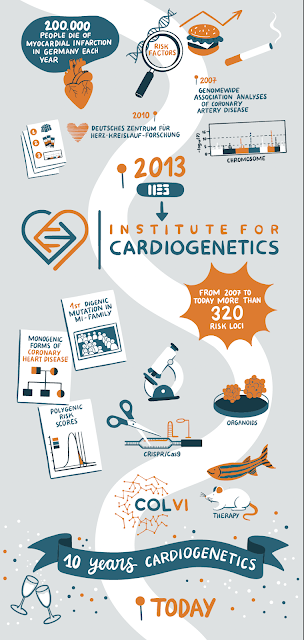Celebrating a Decade of Pioneering Research: The Institute for Cardiogenetics Marks Its 10th Anniversary
Since its establishment in 2013, the Institute for Cardiogenetics has made remarkable strides in advancing the understanding and treatment of cardiovascular diseases. As we celebrate our 10th anniversary on May 5/6, 2023, we reflect on our journey and significant achievements in cardiogenetics.
Over the years, our team members and collaborators have identified numerous "druggable" targets in the context of atherosclerosis, such as GUCY1A3, ADAMTS7, PHACTR1, ANGPTL4, and more. Currently, we are testing the therapeutic potential of ADAMTS7 in the laboratory using mouse and minipig models. Concurrently, we are also working on deciphering the underlying mechanisms at GWAS loci through various experiments.
In collaboration with Prof. Dr. Wienbergen of the Bremer Herzen Foundation and the Institute for Human Genetics at the University of Bonn, we are developing polygenic risk scores for cardiovascular diseases.
We strive for diversity in our research subjects and are grateful for our longstanding partnerships with colleagues from Pakistan.
Furthermore, we have a working group dedicated to developing gene therapy approaches for the rare neuromuscular disease, Collagen-VI Muscular Dystrophy.
Utilizing omics data and integrating it with experimental data from mice, zebrafish, and human cell culture models, we continue to investigate the molecular mechanisms behind the inherited predisposition to coronary artery disease (CAD) and myocardial infarction (MI). Through our efforts, we have identified more than 300 genetic risk loci for CAD/MI.
Our Experimental Genomics research groups focus on understanding the functional role of risk genes and the underlying mechanisms leading to diseases such as atherosclerosis, calcification, blood pressure, inflammation, and intima-media thickness. We have established a resource of knockout (KO) mice models, a platform for studying atherosclerosis and angiogenesis in zebrafish, and cell-based assays. Additionally, we have expanded our portfolio to include iPS cell-derived vascular smooth muscle cells and endothelial cells.
As we embark on the next decade, the Institute for Cardiogenetics remains committed to pushing the boundaries of cardiovascular research and developing innovative therapies to improve the lives of those affected by these devastating diseases.

Comments
Post a Comment